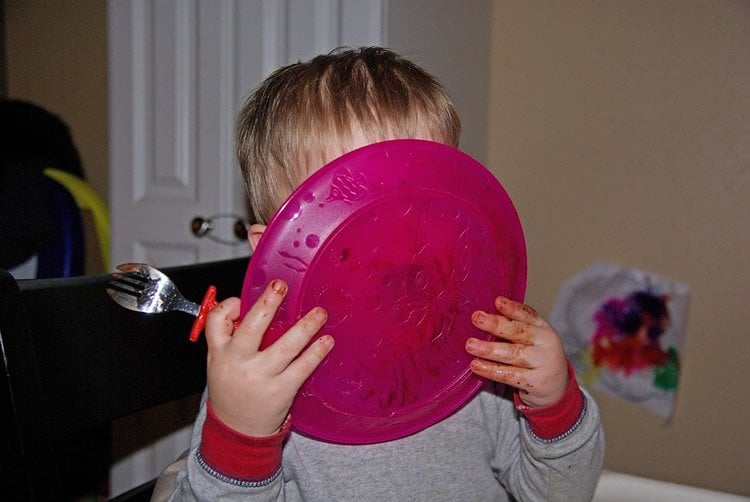Summary: Babies pay close attention to what food is eaten around them and who is eating it, a new study reports.
Source: Cornell
At the dinner table, babies do a lot more than play with their sippy cups, new research suggests.
Babies pay close attention to what food is being eaten around them – and especially who is eating it – according to a study published in the Proceedings of the National Academy of Sciences. The study adds evidence to a growing body of research suggesting even very young children think in sophisticated ways about subtle social cues.
The authors found 1-year-olds expect people to like the same foods, unless those people belong to different social or cultural groups, such as those that speak a different language. The study underscores just how tightly our food choices are coupled with our social thinking, said Katherine Kinzler, a co-author of the study and an associate professor of psychology and human development at Cornell University.
“Kids are sensitive to cultural groups early in life,” said Kinzler. “When babies see someone eat, they are not just learning about food – they are also learning about who eats what with whom. An ability to think about people as being ‘same versus different’, and perhaps even ‘us versus them,’ starts very early in life.”
Kinzler and her co-authors, Zoe Liberman, Amanda Woodward and Kathleen Sullivan, set up a series of studies in which they showed more than 200 1-year-olds a series of videos of people expressing like or dislike of foods. When the babies saw two people in the video speak the same language or act as if they were friends, the children expected them to like the same foods. When they saw two people who spoke different languages or acted as if they were unfriendly, the babies expected them to like different foods.

The studies took advantage of a well-known fact in developmental psychology: Babies will look longer at novel actions or things that deviate from their general expectations of the world.
The study also showed babies have a slightly different take when it comes to foods that might harm them. When the babies saw a person act disgusted from eating a food, they expected that a second person would also be disgusted by that food – even if the second person was from a different social group. This suggests “infants are particularly vigilant to social information that might signal danger,” the study said.
And the researchers discovered an insight into what babies identify as meaningful cultural differences. While monolingual babies expected people who speak different languages to like different foods, bilingual babies expected that people who speak different languages would eat the same foods. They might have had experience with this in their own home, where people speaking different languages are gathered around the table. “Language wasn’t marking groups in the same way for these kids,” Kinzler said.
The work may have implications for policymakers interested in shifting people’s unhealthy eating habits. “If you’re thinking about places to intervene in people’s eating, framing food selection as a social problem as opposed to a nutritional problem might be a good way to get at it,” Kinzler said.
And parents might consider that their children are watching as they eat together. “If you feed your child the perfect diet, yet your child sees you and your friends and family eating junk food, she is presumably learning about foods from her social experiences, too,” she said.
Source: Rebecca Valli – Cornell
Image Source: NeuroscienceNews.com image is in the public domain.
Original Research: Abstract for “Early emerging system for reasoning about the social nature of food” by Zoe Liberman, Amanda L. Woodward, Kathleen R. Sullivan, and Katherine D. Kinzler in PNAS. Published online June 29 2016 doi:10.1073/pnas.1605456113
[cbtabs][cbtab title=”MLA”]Cornell “Babies Chew on Subtle Social and Cultural Cues at Mealtime.” NeuroscienceNews. NeuroscienceNews, 2 September 2016.
<https://neurosciencenews.com/baby-social-cue-eating-4957/>.[/cbtab][cbtab title=”APA”]Cornell (2016, September 2). Babies Chew on Subtle Social and Cultural Cues at Mealtime. NeuroscienceNew. Retrieved September 2, 2016 from https://neurosciencenews.com/baby-social-cue-eating-4957/[/cbtab][cbtab title=”Chicago”]Cornell “Babies Chew on Subtle Social and Cultural Cues at Mealtime.” https://neurosciencenews.com/baby-social-cue-eating-4957/ (accessed September 2, 2016).[/cbtab][/cbtabs]
Abstract
Early emerging system for reasoning about the social nature of food
Selecting appropriate foods is a complex and evolutionarily ancient problem, yet past studies have revealed little evidence of adaptations present in infancy that support sophisticated reasoning about perceptual properties of food. We propose that humans have an early-emerging system for reasoning about the social nature of food selection. Specifically, infants’ reasoning about food choice is tied to their thinking about agents’ intentions and social relationships. Whereas infants do not expect people to like the same objects, infants view food preferences as meaningfully shared across individuals. Infants’ reasoning about food preferences is fundamentally social: They generalize food preferences across individuals who affiliate, or who speak a common language, but not across individuals who socially disengage or who speak different languages. Importantly, infants’ reasoning about food preferences is flexibly calibrated to their own experiences: Tests of bilingual babies reveal that an infant’s sociolinguistic background influences whether she will constrain her generalization of food preferences to people who speak the same language. Additionally, infants’ systems for reasoning about food is differentially responsive to positive and negative information. Infants generalize information about food disgust across all people, regardless of those people’s social identities. Thus, whereas food preferences are seen as embedded within social groups, disgust is interpreted as socially universal, which could help infants avoid potentially dangerous foods. These studies reveal an early-emerging system for thinking about food that incorporates social reasoning about agents and their relationships, and allows infants to make abstract, flexible, adaptive inferences to interpret others’ food choices.
“Early emerging system for reasoning about the social nature of food” by Zoe Liberman, Amanda L. Woodward, Kathleen R. Sullivan, and Katherine D. Kinzler in PNAS. Published online June 29 2016 doi:10.1073/pnas.1605456113






